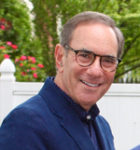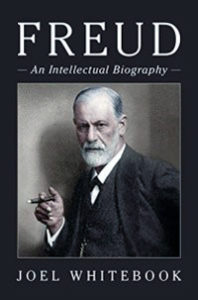Freud: An Intellectual Biography by Joel Whitebook; Cambridge University Press (c) 2017; 496 pages.
By Michael R. Mantell, Ph.D.

 SAN DIEGO — When Don Harrison asked if I’d review a new book about Schlomo Sigismund Freud, known to most as Sigmund Freud, I gladly accepted the opportunity. Why? I’m not sure. Not that I’d spend any time in psychoanalysis trying to figure it out. Perhaps it was simply because I hadn’t read anything new about Schlomo in decades and thought perhaps I’d find something new. Boy, was I right! This is the first major biography of Schlomo, ok, ok, Sigmund, in the last century.
SAN DIEGO — When Don Harrison asked if I’d review a new book about Schlomo Sigismund Freud, known to most as Sigmund Freud, I gladly accepted the opportunity. Why? I’m not sure. Not that I’d spend any time in psychoanalysis trying to figure it out. Perhaps it was simply because I hadn’t read anything new about Schlomo in decades and thought perhaps I’d find something new. Boy, was I right! This is the first major biography of Schlomo, ok, ok, Sigmund, in the last century.
The book, Freud: An Intellectual Biography, was written by Joel Whitebook, Ph.D. The esteemed author is a philosopher and psychoanalyst, was in private practice in New York City for twenty-five years, and is currently on the faculty of the Columbia University Center for Psychoanalytic Training and Research, where he is the Director of the University’s Psychoanalytic Studies Program.
Yes, this is the same writer who, in the New York Times, noted about Donald Trump, “…on the less encouraging side, clinical experience teaches us that work with more disturbed patients can be time-consuming, exhausting and has been known to lead to burnout. The fear here is that if the 45th president can maintain this manic pace, he may wear down the resistance and Trump-exhaustion will set in, causing the disoriented experience of reality he has created to grow ever stronger and more insidious.”
OK, so maybe that’s why I decided to read this book about Sigmund.
In any case, this rich, fascinating and illuminating biography, highly intellectual indeed, is not for the Instagram, Facebook and Twitter crowd. No, most folks will find this tome way too heavy and beyond the interest of the average 140 character reader. On the other hand, I have no doubt that it will become mandatory for those in the field of psychoanalysis.
Whitebook looks at Freud’s debatable theories about religion and sex through a new, albeit clinical, lens, making the long read quite contemporary.
Perhaps this will grab the attention of some – we know that Freud had hypothesized that everyone was essentially bisexual, including himself, and all could experience fantasies and feelings best described as homoerotic.
Whitebook describes in an even-handed and respectful way, Freud’s homoerotic and still thoroughly intellectual friendship with Carl Gustav Jung. Yet, it was only in 1991 that the American Psychoanalytic Association officially allowed openly gay analysts.
It took the family three generations, as it does with so many Jewish families, to move from being parochial Ostujuden, Eastern European Jews who lived in the restricted world of Galician Jewry on the eastern outskirts of the Austrian Empire, to become completely secularized Jews living in cosmopolitan Western Europe. Sigmund’s father Jacob, a Torah based, learned Jew, did not require his son to learn Talmud. Ooops. Instead, he encouraged Sigmund to read the Philippson Bible, published by a scholar of religious and secular subjects. Sigmund’s father wanted his son to be both religious and modern. Ooops. With a great deal more detail, we learn how in this masterpiece biography, Sigmund broke with Jewish tradition and became a secular, skeptical scientist.
Perhaps Sigmund’s mother Amalie (nee Nathanson), an odd, narcissistic woman as many described her including her granddaughter the famed analyst, Anna, had a traumatic influence on her son. She suffered through understandable depressions after the death of a second son born, after her idealized, “my son, the doctor, Schlomo,” and she essentially left our hero to be raised by a Catholic nanny. Think Oedipal.
This work is proof that Freud, like a revenant, is not going away. The nearly 500 pages in this vivid portrait is a testament to the fact that there is always more and new material to uncover about this genius thinker.
Not an analyst? No plans of every going into psychoanalytic treatment? Perhaps you’d find a chapter or two to be illuminating enough. Or so heavy it’d prompt you to get off the couch and go for a walk. Either way, you’ll win.
*
Dr Michael Mantell, based in San Diego, provides coaching to business leaders, athletes, individuals and families to reach breakthrough levels of success and significance in their professional and personal lives. Mantell may be contacted via michael.mantell@sdjewishworld.com